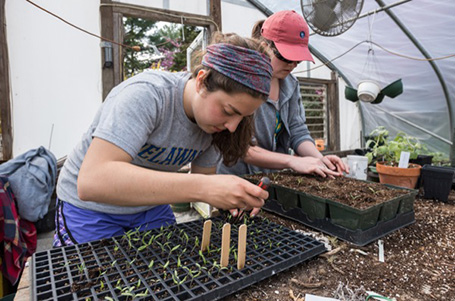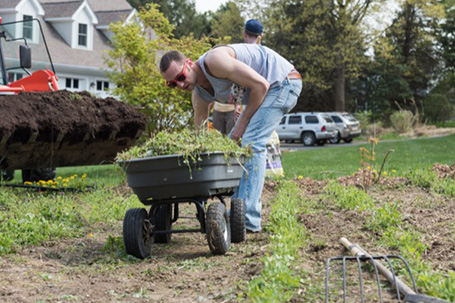Environmental humanities : Growing awareness
Environmental humanities students get down-to-earth experience

At the University of Delaware, public policy student Emily Floros is focused on public health and on finding ways to help people improve their nutrition and access to food. Aidan Leddy, with a major in criminal justice and a minor in journalism, is always looking for new experiences that he can incorporate into his writing.
Now, thanks to an environmental humanities class in which students volunteer at a local organic farm, they both have new insights.
?When I heard about this class, I knew I wanted to ?get down in the dirt? ? literally ? and see what it means to operate a small organic farm and what that means to the community,? Floros said. ?I realized how little people know about how they get their food and how hard it can be to make healthy choices.?
Leddy, who has had summer landscaping jobs to help pay for his education, said he enjoys being out of the classroom occasionally and working outdoors again.
?But now I see this kind of work as more than a way to make money,? he said. ?I see it as a way to learn about organic agriculture and what it can mean to people and the environment.?
He and Floros are part of a journalism class focused on environmental issues, taught this spring semester by McKay Jenkins, who is Cornelius Tilghman Professor of English.
Students in the class, offered as part of UD?s environmental humanities program, read, discussed and wrote about a variety of topics related to sustainability, and about half of them also volunteered regularly at Fair Weather Farm in nearby Fair Hill, Maryland. The final requirement of the class was a personal essay incorporating one of the topics covered in the course, such as organic farming, and the student?s own experience with it.
?This project will allow students to build, tend and harvest their own organic garden plot at Fair Weather Farm ? and, in the process, see for themselves (with their eyes and their hands) how local, organic food production works,? Jenkins wrote in a description of the class.
On a warm spring day recently, he and four students joined the farm?s owner, Nancy Bentley, at Fair Weather. They tilled a vegetable plot with hoes, weeded between pea plants and prepared to transplant kale and other seedlings from the farm?s greenhouse.
Bentley obtained organic certification in 2008 and sells produce at the farm?s market and through weekly ?community supported agriculture (CSA)? shares, consisting of boxes of fresh produce.
Jenkins began taking students to the farm in February, when most work was done in the greenhouse. He plans to continue offering the environmental journalism class in future semesters and encouraging students to learn firsthand about food production.
?The group this semester is doing the grunt work of planting, hoeing, weeding,? he said. ?In the fall, I expect that about 50 environmental humanities students will be out here, harvesting like crazy.?

Students, many of whom had taken previous classes with Jenkins, said the work at the farm added an important perspective to what they learned in more traditional ways.
?When I took this class, I knew it was going to be a treat ? a chance to do really interesting things in the classroom and outside of it,? said Kelsey Burke, who has a major in energy and environmental policy and a minor in environmental humanities. ?I feel like what we do here at the farm engages us in the land and in the process of learning about the issues we?ve been studying, like where our food really comes from.?
For Leddy, working at the farm is enjoyable as well as educational, but it also provides material for his interest in journalism.
?Students who like to write are always being told to write about our own experiences, but then we sit in class and don?t have those experiences,? he said. ?I like this class because it gives you the chance to do different things in addition to regular academic activities.?
The ?Environmental Humanities Farm Plot? project has been supported by the College of Arts and Sciences? Interdisciplinary Humanities Research Center.
About the environmental humanities minor
The environmental humanities program was established because, although the sciences provide basic insight into environmental issues, a growing number of scholars, policymakers and environmental professionals have recognized that many of the most basic environmental questions are humanistic.
The 18-credit minor gives students from a variety of majors across UD the chance to think more rigorously and imaginatively about environmental issues by integrating the insights of many disciplines. Course topics include environmental literature, nature and history, and environmental ethics.
The minor is designed to be attractive to two distinct groups of students: those in the sciences hoping to deepen their understanding of environmental issues and to learn more effective means of communicating their own work; and those in the humanities wishing to study complex environmental issues without having to major in the sciences.
